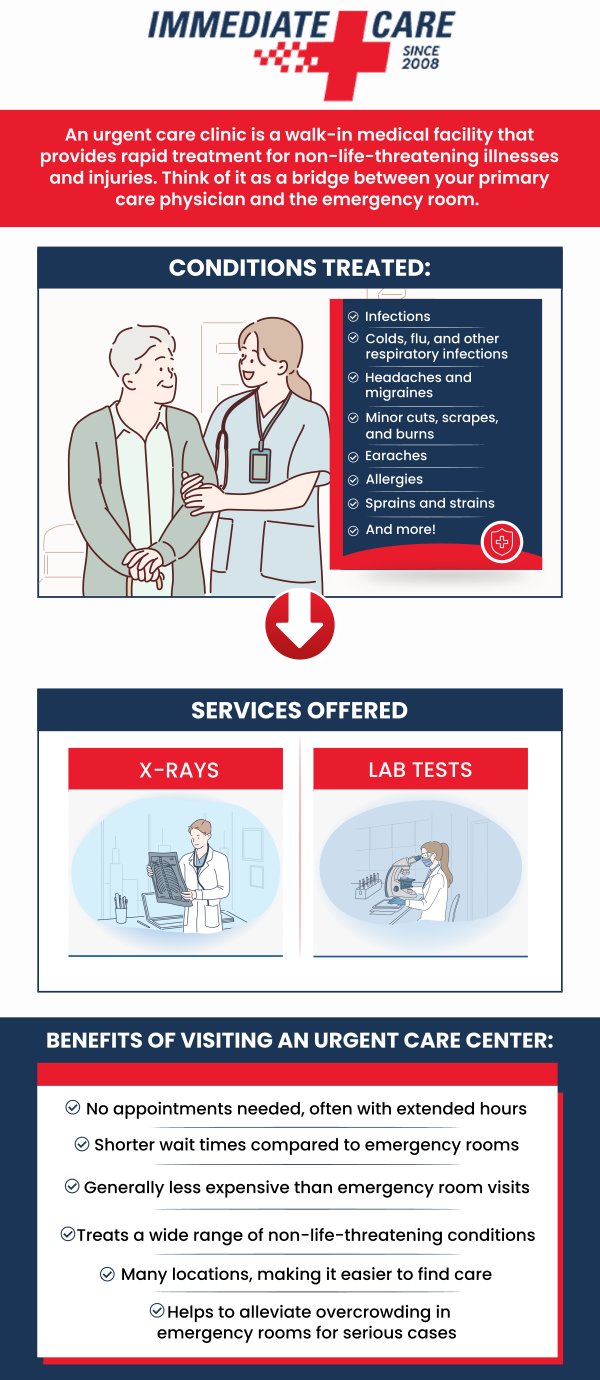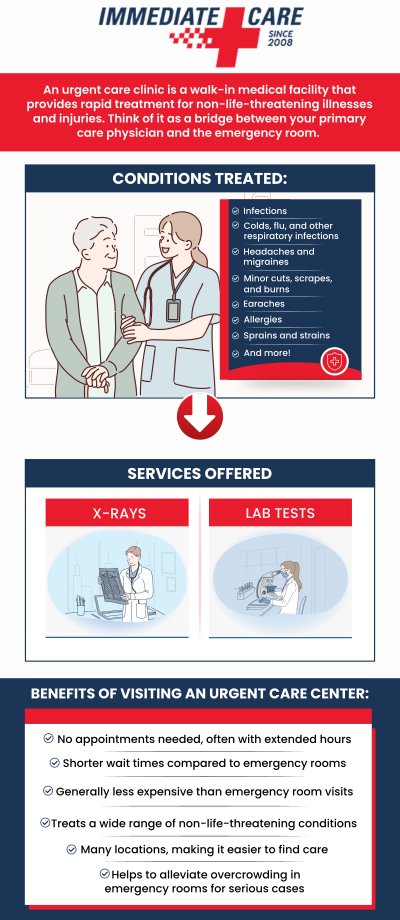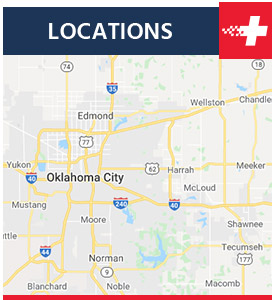Signs You May Need to Visit an Urgent Care Q&A
Signs indicating a need for urgent care include minor injuries like wounds and sprains and non-life-threatening conditions like fevers and flu symptoms. Urgent care is also suitable for mild asthma attacks or urinary tract infections, as it provides prompt examination and treatment for a range of medical conditions. If you need medical attention, consult Dr. Kevin Penwell (D.O.) and his staff at Immediate Care of Oklahoma. For more details, contact us or you can also book an appointment online or simply walk in. We have convenient locations to serve you in Edmond OK, Norman (24th) OK, Norman (HealthPlex) OK, Tecumseh OK, West Moore OK, I-240 and Sooner RD OK, Yukon OK, and Choctaw OK.




Table of Contents:
What are urgent symptoms?
What kind of doctor will treat me at an urgent care?
Which medical conditions qualify as urgent?
What are the benefits of visiting an urgent care clinic?
At Immediate Care of Oklahoma, we understand how challenging it can be to decide when to seek medical attention for sudden illnesses or injuries. Recognizing the signs that warrant a visit to urgent care is crucial for your well-being. Whether it’s an unexpected fever, a minor bone fracture, or symptoms of an acute illness, knowing when to visit Immediate Care of Oklahoma can ensure you receive timely and effective treatment. Our dedicated team is committed to providing immediate, top-notch medical care to help you return to your daily activities as quickly as possible.
Urgent symptoms are those that are not life-threatening but require prompt attention to prevent severe complications or long-term health issues. These include but are not limited to, severe pain or discomfort, sudden or significant loss of vision, deep cuts or bleeding that won’t stop, high fevers, especially in children, and signs of a heart attack or stroke, such as chest pain, trouble breathing, or abrupt changes in speech or mobility. Broken bones or injuries that require X-rays or direct medical intervention also fall under the category of urgent symptoms. Understanding these signs is vital to seeking the necessary care promptly, ensuring quick recovery, and minimizing the risk of worsening conditions.
At urgent care centers, patients are typically treated by a variety of healthcare professionals, including board-certified doctors who specialize in emergency medicine or family care. These physicians possess a broad range of knowledge that enables them to address an array of urgent health issues efficiently. In addition to doctors, urgent care facilities often have nurse practitioners and physician assistants on staff, who are qualified to diagnose and treat illnesses, prescribe medications, and perform procedures under the supervision of a doctor. This multidisciplinary team approach ensures that patients receive comprehensive care for their urgent medical needs in a timely and effective manner.
Medical conditions that qualify as urgent are those that require immediate care but are not severe enough to necessitate an emergency room visit. These conditions can range widely, encompassing various acute illnesses and injuries. For instance, respiratory conditions such as moderate asthma attacks, bronchitis, and flu symptoms often need urgent medical attention to manage discomfort and prevent complications. Skin conditions including moderate burns, cuts requiring stitches, or severe rashes also fall into this category, as do gastrointestinal issues like food poisoning or severe dehydration. Additionally, urinary tract infections, sprained or mildly broken limbs, and non-life-threatening allergic reactions are examples of situations that warrant a visit to urgent care. Recognizing these conditions as urgent is essential for getting prompt treatment, which not only aids in quicker recovery but also helps in averting more serious health issues down the line.
Visiting an urgent care clinic presents multiple advantages for individuals experiencing non-life-threatening medical conditions that require prompt attention. One of the primary benefits is the convenience of accessing medical care without the need for an appointment, allowing patients to receive treatment much quicker than the often long wait times associated with primary care providers or the emergency room. Urgent care clinics are also known for their extended hours, including evenings and weekends, making healthcare accessible outside of typical business hours. The cost of treatment at an urgent care facility is generally lower than that of an emergency room visit, offering a more affordable option for immediate medical services. Additionally, these clinics are equipped to handle a wide range of health issues, from injuries and infections to diagnostic services and vaccinations, providing a one-stop solution for urgent healthcare needs. This streamlined approach to care ensures that patients receive timely and effective treatment, aiding in a faster recovery process.
At Immediate Care of Oklahoma, we stand ready to serve your urgent medical needs with professionalism and compassion. We understand the importance of receiving prompt care for non-life-threatening conditions and strive to make our services as accessible as possible. Whether it’s for sudden illnesses, injuries, or any urgent medical concerns, our team is here to provide the necessary care to help you recover swiftly and safely. Do not hesitate to call us or book an appointment online today. Our priority is your health and well-being, and we are committed to ensuring you get back to feeling your best as quickly as possible. We have convenient locations to serve in Oklahoma City, OK. We serve patients from West Moore OK, Norman (HealthPlex) OK, Norman (24th) OK, Edmond OK, Yukon OK, I-240 & Sooner RD OK, Tecumseh OK, and Choctaw OK.


Additional Services You May Need
▸ Urgent Care Services
▸ Illness + Injuries
▸ On Site Lab + X-Ray
▸ Helpful Health
▸ Motor Vehicle Accidents
▸ Drug Testing
▸ MRO
▸ UTI Treatment
▸ Employment Physicals
▸ Workers Comp
▸ Strep Throat Treatment
▸ Pregnancy Testing
▸ Blood Pressure Testing
▸ Urinalysis
▸ Mononucleosis Treatment
▸ Suture Removal
▸ Respiratory Syncytial Virus
▸ OccMed








